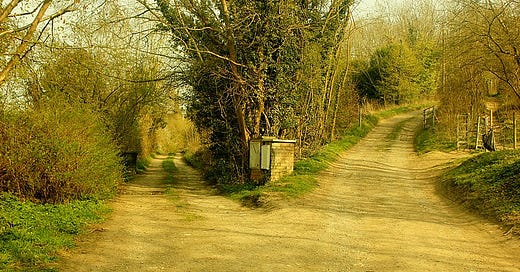Fork in the road on Roughdown Common. - geograph.org.uk - 2914584.jpg/ Wikimedia Commons
After roughly three decades of working in public libraries, I retired in August (time will tell if this is permanent). I embarked upon my career in 1994, on the cusp of the internet revolution, so I have witnessed a great deal of change in libraries over the course of my career, as well as in my own impressions of the profession.
Early on, I was impatient with what felt like the “status quo” nature of libraries. Although public libraries were inarguably a net good, they also seemed to function as a mere “band-aid” to “the system.” Yes, they offered free self-education, but they didn’t seem to alter the capitalist system so much as reflect it and acclimate people to it in the name of survival. There were always a few radical works on the shelves for patrons to discover, but they were counterbalanced by conservative texts and generally overwhelmed by popular, mainstream literature.
Putting a splint on a broken arm in first aid class8d23053v.jpg/ Wikimedia Commons
Since those entry-level jobs of my 20s, I have, however, been involved in projects that felt significant in terms of helping to move the needle on important causes and to improve people’s lives. Over the course of my career I organized community-wide reading programs on topics such as illegal immigration with The Devil's Highway, traditional healing with Bless Me, Ultima, environmental pollution with Plastic Ocean, alternative modes of transportation with Bicycle Diaries, and human and wildlife coexistence with Coyote America. Around 2001, I took on the challenge of a branch library with low circulation numbers and created a grant-funded graphic novel collection that proved popular with the surrounding community (and introduced me to the wonder of Love and Rockets). I later worked at a community library located in an area with a significant gay population, where I held programs on LGBT issues and selected material for a dedicated LGBT collection. In another job I held a sewing series with Frau Fiber and a film program on urban farming.
Kanapou Pollution.jpg/ Wikimedia Commons
While a primary mission of public libraries is to provide a wide array of material for recreational and educational use, during the course of my career, there have been ample opportunities to push particular issues to the fore. I was also introduced to numerous noteworthy projects that were decades in the making, such as the American Indian Resource Center, Asian Pacific Resource Center, Black Resource Center, and Chicano Resource Center that are all part of LA County Public Library.
While I stand by the projects I had a hand in, many of my prior assumptions have been shaken over these past few turbulent years, as reflected by the first caller to an episode of Wesley Yang’s Conversations in Year Zero. I now see the folly of believing I had things figured out in my youth, as I am uncertain of so much in my fifties. While the “left” and “right” have never been monoliths (the left in particular is prone to hair-splitting fissures), in the last five years or so, against the backdrop of another historical side-switching on issues ranging from war to monetary policy, a political earthquake has erupted, leaving a landscape strewn with re-alliances as well as a politically homeless contingent (from Christians to progressives) that feels estranged from both the Republicans and the Democrats as well as the brewing authoritarianism on both sides of the aisle. Growing calls to end the left right divide may result in new political parties.
In the midst of this turmoil, mass media has become increasingly polarized and media confidence ratings are at record lows. Media consolidation increases the sense amongst the public that media no longer represents them; billionaire donations increase suspicion that the wealthy are setting the agenda. Fact-checking sites such as NewsGuard and Reuters and even primary research itself may be compromised by corporate interests. Journalistic standards overall appear to be in decline.
Distrust in social media platforms grows alongside wariness of mainstream news outlets. There is no guarantee on social media sites that one is interacting with real people. Allegations have been made that some figures are amplified by bot farms and that foreign countries use bots for purposes of manipulation or to sow division. At the same time, social media censorship has fueled further mistrust and communication breakdown.
Outside of social media, search engines stand accused of bias and manipulation.
The hemorrhaging of trust in political parties, the media, communication channels, institutions, and even each other is profoundly destabilizing. We are living in Pynchon's universe now, a hall of mirrored PSYOPS, with references to the red pill tossed around with such frequency that the term can now refer to almost anything.
Red and blue pill.jpg/ Wikimedia Commons
Philosopher Steve Patterson believes we are living in a dark age. If so, could widespread distrust lead to needed reform? Could libraries help facilitate the next enlightenment?
Beneath this sea of conflict, uncertainty, and distraction lies the emerging Fourth Industrial Revolution, ensuring further disruption. Entities ranging from the Cato Institute to the ACLU are weighing in on such looming possibilities as a cashless society.
Where should libraries position themselves amidst this chaos? To my mind, they should embrace that old moth-eaten ideal…that tepid, mealy-mouthed stance that reeks not just of “both-sidesism” but of “all-sidesism”…that is… wait for it… neutrality. Yes, that milquetoast staple that seemed about as exciting as a bowl of warmed-over oatmeal in the early days of my career now feels like the most radical position an institution could take.
Kaurapuuro.jpg/ Wikimedia Commons
If the library field had emphasized neutrality these last few years, rather than advocate against it, it could have built on the goodwill it already garners and positioned itself as the premiere institution for sense-making. What if libraries had expanded upon the 2017 Libraries Are for Everyone campaign and spotlighted viewpoint diversity? Neutrality could have had its day in the sun and libraries coulda been a contender for the most trusted institution in the country. Unfortunately, despite the potential of that strategy for providing libraries with a renewed relevance, there may not be much in the way of funding in it.
Rod Steiger Marlon Brando On the Waterfront.jpg/ Wikimedia Commons
Perhaps it makes sense that the library world is, at least in theory, committing to the same social justice narrative as government, academia, the military, and corporate America. This pivot to the rhetoric of social justice ironically reinforces my earlier perception that libraries don’t alter the “system” so much as reflect it and acclimate people to it. And as always, libraries contain counter-narrative materials that, while they may not be highlighted, are awaiting discovery.
Over the past few years, in my own small way, I have advocated for a sense-making approach grounded in neutrality, but it did not seem to be a popular position, even though it might have helped the field navigate the culture wars more successfully. Librarians are unlikely to respond to censorship attacks by emphasizing the viewpoint diversity in their collections if they no longer believe in the value of that diversity.
It is difficult to truly know, however, where my colleagues stand in regard to current trends and debates. While there is some coverage in the library literature regarding misinformation, the broader breakdown in institutional trust and the great political earthquake of the past few years have not, to my knowledge, been addressed. 4th IR technologies and their associated ethical issues are touched on here and there but are not covered nearly as frequently as general issues related to DEI or as consistently as issues regarding the internet were covered in the 1990s and early aughts. Librarians continue to initiate worthwhile projects that help to increase understanding between disparate groups; these initiatives are now often carried out under the banner of DEI but don’t represent a radical left turn so much as a continuation of what has gone before. Despite what appears to be a progressive bias in the review journals, library collections, from what I have observed, remain balanced. The more vocal social-justice oriented librarians advocating against neutrality seem to be setting the terms of the debate (and in actuality settling the core debate before it has been fully aired); those who disagree likely feel stifled. My guess is that the majority of librarians are “old-school progressive liberals” as described by Carol Horton and as such are going along with the new framing of the “post-liberal woke vanguard” out of some combination of sympathy, righteousness, ambition, confusion, conformity, lack of awareness, exhaustion, self-preservation, or fear.
As I head off into the next phase of my life in this strange new world, I still have faith in libraries and the hardworking, well-intentioned, dedicated, and, yes, ideologically diverse staff who run them. You can continue to catch me on Heterodoxy in the Stacks, discussing topics related to libraries, or down at my local public library, registering for a library card.
Solo Adventures (Unsplash).jpg/ Wikimedia Commons
To promote viewpoint diversity, Heterodoxy in the Stacks invites constructive dissent and disagreement in the form of guest posts. While articles published on Heterodoxy in the Stacks are not peer- or editorially-reviewed, all posts must model the HxA Way. Content is attributed to the individual contributor(s).
To submit an article for Heterodoxy in the Stacks, send an email with the article title, author name, and article document to hxlibsstack@gmail.com. Unless otherwise requested, the commenting feature will be on. Thank you for joining the conversation!













I'm part of the same cohort -- I attended library school from '91-'93 -- and your experience really resonates with me. I used to espouse radical librarianship and view neutrality with disdain but now I realize both how valuable it is, and how it needs to be properly understood: not as the presumed absence of values, but as the ethical commitment not to impose values on others.
The neutrality ethos of public librarianship is not dead, it's just being out-shouted at the moment. It will not be undone by the politicized sophistry of the adversary culture in the universities/library schools.
https://apoliticallibrarian.wordpress.com/2022/04/20/no-mere-mechanism-the-library-neutrality-statement/